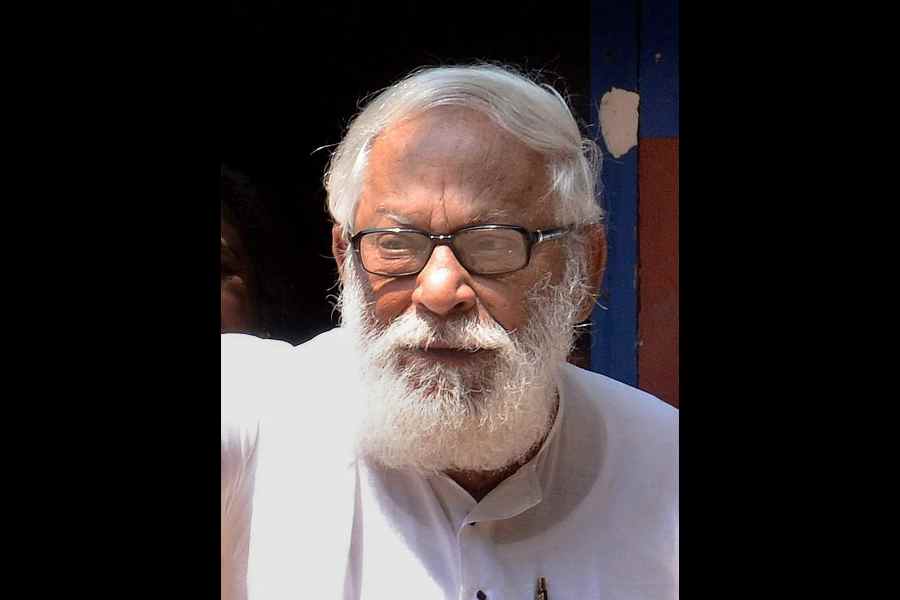A film buff who gorged on Andrei Tarkovsky and Ritwik Ghatak. A Marxist who loved Marquez. A chief minister who could recite Tagore’s Gitabitan from memory.
Buddhadeb Bhattacharjee would be remembered for politics that most of Bengal was unfamiliar with. It was creative and tried to do things differently. Many who were familiar with his appreciation of the arts are not surprised that he looked at things through a different prism.
Bhattacharjee’s intellectual appetite set him apart from the run-of-the-mill politician, they said.
“He was a full-time politician. But I often found him to be more concerned with cultural upheavals than political developments,” said Sanjoy Mukhopadhyay, a former professor of film studies at Jadavpur University.
“I have rarely come across people who could recite the entire Gitabitan from memory. Buddhadeb Bhattacharjee was one of them. It is not just one or two songs (Gitabitan is a collection of more than 2,000 songs by Rabindranath Tagore). He was not a professor of Bengali literature. When I realised that heremembered Gitabitan by heart, he was the deputy chief minister,” Mukhopadhyay said.
Bhattacharjee was “obsessed” with World War II films and books.
Mukhopadhyay met Bhattacharjee for the first time in 1971. Mukhopadhyay was among the students at Jadavpur University who brought out a booklet on a woman who was assaulted at a police station. The booklet, which had a small piece by Mukhopadhyay, quoted from Albert Camus’s diaries.
“He found me out and met me. He put his hand on my shoulder and said: ‘You read Camus’. He discussed The Fall (a novel by Camus, his last complete work of fiction) with me at length. Back then I had yet to come across a person with such an exhaustive understanding of Camus,” said Mukhopadhyay.
He has spent many hours with Bhattacharjee at what was then the Satyajit RayArchive, a room on Nan-dan’s second floor. It was Bhattacharjee’s de facto chamber at Nandan.
Old-timers at Nandan recalled a large wooden table surrounded by leather-cushioned chairs. A rack stuffed with old video cassettes and CDs bore witness to the former chief minister’s passion for films.
“He loved watching films. He would spend a couple of hours every day watching films. It had almost become a habit. Reading books and watching films fed his intellectual appetite. He wouldreach Nandan around 6.30pm every day and leave around 8.30. He would go home and spend time reading,” recalled Ansu Sur, a former directorof Nandan and Bhattacharjee’s associate for close to 30 years.
Bhattacharjee had a voracious appetite for films. “Hollywood war drama to Godard’s New Wave and Ritwik Ghatak’s Partition saga, he watched everything,” a former Nandan advisory board member said.
Mukhopadhyay said Bhattacharjee would not hesitate to go against his own party when it came to films. “I remember how he went ahead with a controversial film on Lenin by (Russian director Alexander) Sokurov despite immense resistance from within his party,” he said.
Taurus, a 2001 film on the last days of Lenin, shows him in failing body and mind, contemplating suicide, ranting against Jews and visitingprostitutes.
Former chief minister Jyoti Basu and many others in the CPM had expressed their displeasure about the film, which was screened to a select audience in the run-up to the 2001 Calcutta Film Festival, which was like Bhattacharjee’s baby. Mukhopadhyay was part of the audience.
“Down the years, it seemed to me that the way he read (Gabriel García) Márquez and (Jorge Luis) Borges is remarkable. He read between the lines,” said Mukhopadhyay.
Bhattacharjee’s love for the arts was not confined to the screen or books. Bhattacharjee quit the Left Front government in 1993 over differences with Jyoti Basu.
He was reinstated after a couple of months. Duringhis period off power, Bhattacharjee wrote a play titled Dushshamay (Bad Times). It is a poignant denunciation of the times.
Samik Bandyopadhyay, academic, litterateur, translator, publisher and theatre expert, knew Bhattacharjee from “his student days” at (then) Presidency College. Bandyopadhyay was part of the outgoing batch when Bhattacharjee just entered college.
In the early 1980s, dramatist and theatre directorBadal Sircar had to be hospitalised.
“He was admitted to a nursing home on Bondel Road. His friends and associates collected some money for his treatment. I went to Bhattacharjee’s home to seek help. He was not home. I talked to his wife. The same night,after Bhattacharjee came home and learnt about Sircar, he visited the nursinghome. He got Sircar shifted to SSKM and ensured that the expenses were borne bythe government,” said Bandyopadhyay.
Koushik Sen, stage and screen veteran, said: “He read Franz Kafka. He had a firm knowledge of the history of Bengali theatre. And all this despite being a full-time politician.”










